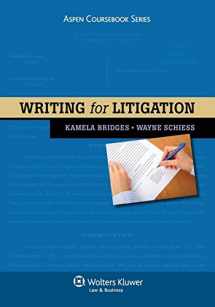
Writing for Litigation (Aspen Coursebooks)
ISBN-13:
9781454802730
ISBN-10:
1454802731
Edition:
60066th
Author:
Wayne Schiess, Kamela Bridges
Publication date:
2011
Publisher:
Wolters Kluwer
Format:
Paperback
246 pages
Category:
Legal Writing
,
Legal Education
,
Litigation
,
Rules & Procedures
FREE US shipping
Rent
35 days
Due Jun 08, 2024
35 days
from $12.30
USD
Book details
ISBN-13:
9781454802730
ISBN-10:
1454802731
Edition:
60066th
Author:
Wayne Schiess, Kamela Bridges
Publication date:
2011
Publisher:
Wolters Kluwer
Format:
Paperback
246 pages
Category:
Legal Writing
,
Legal Education
,
Litigation
,
Rules & Procedures
Summary
Writing for Litigation (Aspen Coursebooks) (ISBN-13: 9781454802730 and ISBN-10: 1454802731), written by authors
Wayne Schiess, Kamela Bridges, was published by Wolters Kluwer in 2011.
With an overall rating of 4.3 stars, it's a notable title among other
Legal Writing
(Legal Education, Litigation, Rules & Procedures) books. You can easily purchase or rent Writing for Litigation (Aspen Coursebooks) (Paperback, New) from BooksRun,
along with many other new and used
Legal Writing
books
and textbooks.
And, if you're looking to sell your copy, our current buyback offer is $0.35.
Description
Writing for Litigation offers in-depth coverage and helpful tips for every type of document associated with the life of a case, from the client engagement letter to motions, discovery, client communications, affidavits, and more. Systematically examining each document and its constituent parts, this remarkably concise text explains how audience, purpose, and strategy determine the content and tone of effective writing.
Ideal as a coursebook, supplement, or reference, Writing for Litigation features:
- broad coverage that includes
- every type of case document, from the client engagement letter to pleadings, discovery requests, and motions
- ancillary documents that lawyers frequently draft, including demand letters, client communications, and affidavits
- how the audience and the object of the document determine tone and content
- strategic considerations that influence how a document is written
- a clear guide to the component parts of every type of document
- examples of every type of document in the Appendix
- writing tips that address concerns typically arising in practice , such as
- how to avoid ambiguity
- how to adapt form documents to your individual case
- how to avoid unintended sexism in writing


We would LOVE it if you could help us and other readers by reviewing the book
Book review

Congratulations! We have received your book review.
{user}
{createdAt}
by {truncated_author}


